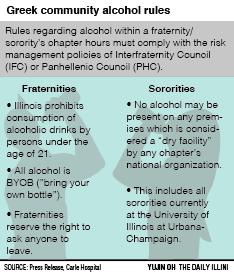Debate regarding alcohol in Greek chapter houses shines light on gender equality issues

April 29, 2015
The rules of having alcohol on a Greek chapter’s house premises differ dramatically between fraternities and sororities.
Kelly Doherty, president of Delta Gamma and junior in education, said alcohol is banned by their national executive board for insurance purposes. If there was a fire in the house, and the fire department found alcohol in the rubble, the home insurance policy could be voided and the chapter would lose the funds necessary to rebuild.
This contrasts the policies regarding alcohol in fraternity chapter houses. Josh Dubois, president of Alpha Gamma Rho and junior in Business, said his fraternity no longer allows kegs within the house, but fraternities on campus have little to no restrictions on the presence of hard alcohol or any other alcoholic beverages.
House rules are set by each organization’s national or international policies. The University Greek system enforces the rules set by the Interfraternity Council and Panhellenic Council in the Risk Management Policy, which was last revised in September 2014.
Glenn Hohn, associate director of Fraternity and Sorority Affairs, said the policy itself does not restrict sorority houses from having alcohol on the premises, but rather reinforces the rules that are made by a chapter’s national executive board.
Get The Daily Illini in your inbox!
“If tomorrow a national sorority were to change their policy on this, then the above written policy would be edited to reflect that,” Hohn said.
Dubois said these rules are in place because sorority houses are kept in better conditions. If the ban was lifted, he said, sorority houses would have to deal with the messiness of alcohol or parties and potential destruction resulting from it. Typically, fraternities host parties that sorority women are invited to attend, often at no cost to them.
Dubois said he does not see the current standard as unfair for fraternities, despite the hassle having alcohol in a chapter house can cause.
“It comes off as the tradition of how it (has) been done is that the fraternity has always been the place to go when you have a social event with the sorority and that has just kind of stuck,” he said.
Doherty said if the alcohol is coming from the fraternities, members of the sororities cannot be sure of where the alcohol is coming from or what kind of alcoholic drink it is.
She said it is “scary to think about” because there is the potential for drinks to be drugged, but women attending would not be aware.
Doherty said in her three years at the University she has become close friends with the men in certain fraternities so she never worries about her well being. However, for girls who are just meeting members of fraternities, such as freshmen, she said they may feel hesitant.
Taylor Gibson, freshman in LAS, said sorority policies on alcohol do not promote equality within Greek life. She said giving fraternities full control over what is provided during a fraternity party is unfair and unsafe.
“Honestly, girls have no control over what (fraternities) are giving us. We don’t honestly have any way of knowing if they are being respectful or if they are taking advantage of us,” Gibson said.
If the alcohol rules were more lenient, she said, potentially risky situations could be eliminated.
Dubois said safety and comfort is a priority for his fraternity and the chapter strives for all members to be respectful toward women.
“The men who have a balance of social and school are also the men who are a lot more respectful and can create that type of environment when sorority girls do come over,” Dubois said.
Hohn said all college campuses in the country, including the University, are dealing with this issue as they address campus culture change.
In a recent initiative proposed by Dartmouth Unveristy, President Philip J. Hanlon created a plan called “Moving Dartmouth Forward.” In the plan, all students on Dartmouth University’s campus regardless of their age will be prohibited from possessing hard alcohol on campus.
When asked if a plan like this would succeed on the University campus, Dubois said, “Hard alcohol would be driven underground. Kids in college drink, there is not much you can do about it. You have just got to be mindful and manage the risks associated with that.”






